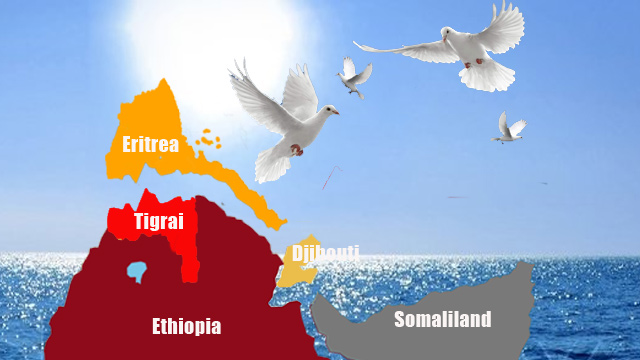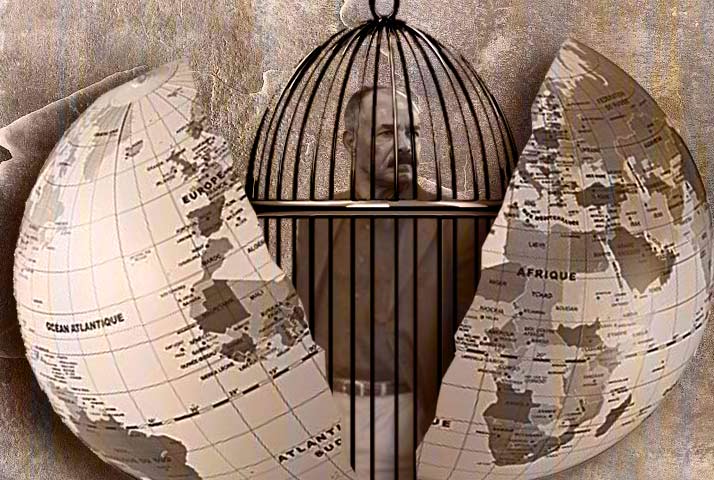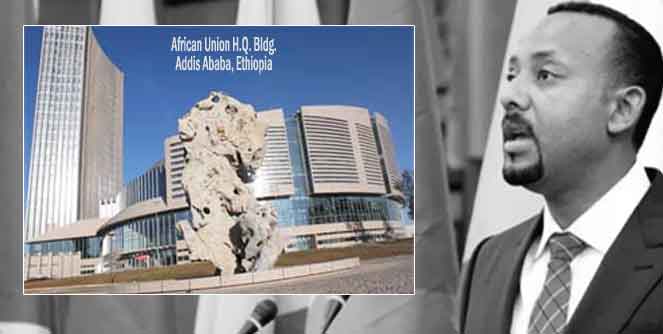Discourse on Eritrea-Tigray Through Personal Praxis

[Editor’s note: Reflections is Beyan Negash’s new column. He selected, edited and presents the following article written by Said on the Awate Forum.]
Intro: For decades our region suffered exceptionally, a grim reality. Those who write simply as an expression of fierce resistance to all kinds of tyrannies related to the Horn of Africa do so at the risk of their own peril. But these are beautiful souls who see and feel writing not only as fundamental as the air they breathe, the impetus of which is social justice, but also because they value human life over anything else. They write against dictatorial and dysfunctional governments and against hypocrites, crooked politicians they despise. These kinds of writers have no interest in vilifying anyone, person or group of a population as a locus of evil. The cause for hope runs way too deep in their souls to entertain any alternative ideas other than one that promotes humanity, diversity, peace, and serenity. They worry about far and near. They write about what goes on in their block and write about what goes on around the globe. They see the interconnectedness of it all. This revised write-up inspired by Said is no exception, it emanates deep from his core being, a journey toward personal praxis via critical discourse, and is made available for readers at large in an article form so more readers can benefit from it. Said write up below emanates deep from his core being, a journey toward personal praxis via critical discourse, and is made available for readers at large in an article form so more readers can benefit from it. //Beyan Negash
___________
In the early 1990s, very few dared to criticize Isaias Afeworki of Eritrean People’s Liberation Front (EPLF), it was a definite no-go area. The same went with Meles Zenawi of Tigray People’s Liberation Front (TPLF), which was a definite no-go area. Even today one cannot write about difficult truths that must be addressed. Opinions are based on a preconceived view of the world even when we say we are justice seekers we often conform to a pre-existing narrative. We are not impartial observers. There is a saying, if someone says it’s raining, and another person says it’s dry, it’s not your job to quote them both. The job of an independent thinker is to look out the window and find out which is true. Sadly, and more often than not, the way the narrative is framed controls the story.
Of course, tradition and culture are part and parcel in the way the narrative is processed. In other words, if certain cultural dispositions tend to value the collective as opposed to individual’s independent thought, one could easily see how the latter would be trashed and thrashed to the core and be made to not stand up against anything that leaders do. Standing up for truth becomes a life-or-death situation for those who try to show independence of thought. This is why we see “mob electronic lynching” here when one’s ideas deviate from that groupthink mentality. No space for individualism, which is why writers are hounded by those who can’t think beyond their groupthink mindset.
Writers ought to write in good faith, that there is always another explanation and another dimension to ideas and thoughts. For over a decade I (Said) stood against Isaias Afewerki (Eritrea’s dictator) and recently against Abiy Ahmed (Ethiopia’s PM) of their serious violations of international law and the illegal use of force against Tigrayans, civilian abuses serious enough to warrant an international criminal court investigation.
The truth, however, remains that I am conflicted on this subject. And, though it pains me to say it and anyone who cares to be free to differ with me on this. It won’t be easy to convince me, however. This is not to praise the monster IA nor the Abiy regime and I am against the war in Tigray to the core of my beliefs in the worth of ordinary human dignity. The ordinary Tigrayan man, woman, and child, and his/her right to live a full life in a dignified manner should never be up for a compromise, even if they are not members of my community – they are human beings like me. I have no animosity toward Tigrayan people. I had nothing good to say about IA and AA though. Perhaps, my praxis on this subject will be better illustrated by proffering an example of the history of Tigray People’s Liberation Front (TPLF).
The late Prime Minister, Meles Zenawi (PM MZ) under the banner of TPLF leadership fought the wrong enemy in Eritrea and in Somalia and did not address the core issues and it never won the war. TPLF and Former PM MZ needed to change the narrative before it became tragic for all concerned; that is to say, all of the people in our region. Neither the war of 1998/2000 nor the 2020/2021 that’s ongoing today were just wars. I am referring, as it is commonly known, to the war in Tigray, that is meant by our region. A War that killed innocent women, children, and old men. Wantonly. And more people will die needlessly. Both wars were not just wars, by a long stretch. St. Augustine’s “Just War Theory” stipulates that a war needs to meet certain moral criteria for it to be justified. The two categories are: (a) Right to go to war (i.e., the morality of a war); and (b) Right conduct in war (i.e., the moral conduct within war)”. The 1998/2000 and the current 2020/2021 war fail to meet the Just War Theory.
We all know how this current war started. Abiy ordered a ground and air military operation in Tigray in early November 4th, 2020 after accusing TPLF of orchestrating attacks on federal army camps. And backed by troops from Eritrea and fighters from Ethiopia’s Amhara region, it grieves us to see Tigray being destroyed, with mass killings, and atrocities and devastating effects on the civilian population. with almost two million forced from their homes. As reported recently, a total of 5.2 million people in Tigray region, or 91 percent of its population, need emergency food aid, the United Nations has warned. with “many people” dying “because of hunger.” And There is a serious risk of famine. This without reservation of believing in politicians created a peril for Tigrayans.
Tigrayans’ trust in leaders subjected them in harm’s way, and their innocence employed against them in ways that would ultimately destroy TPLF and Tigray as we’ve known it. Tigrayan gave an unexamined blanket approval of anything done by TPLF and that was not necessary and wasn’t good for Tigray and ours is no exception. Tigrayan if they did NOT support the war with Eritrea, the implication was that they didn’t love Tigray. They were derided to be called traitors, or as cowards, same thing happened in Eritrea. This makes very little sense. The beginning of the end for TPLF didn’t start with the 4 November 2020 war. It started in the 1998/2000 war when TPLF’s power was at its peak.
It appears the TPLF leadership never bothered to ask some of the critical questions. Questions like, was the first war necessary? Was it wise? Was it worth it? Were they really wise? Was the war to the interest of the Tigrayan population at large? What are the consequences of such an action short, medium, and long term? As the border war wore on and the numbers of dead, of Eritrean and Tigrayan rose higher, it was not worth the sacrifices of young men they asked to make; it became more and more clear that those of us who opposed the war were right but to what end? Those who were in support of it were deadly wrong.
Even in the ones that we know the result of which TPLF succeeded in the first border war. The question remains, at what cost. Tens of thousands of soldiers and civilians have been wounded, killed, uprooted or driven into internally displaced Eritreans. It was a humanitarian catastrophe. Having helped to inflict so much damage on Eritrea, did TPLF succeed in its missions then?
One would therefore expect from TPLF to take note of their win or defeat and no peace no war, in doing so, whether they changed their discourse? Whether TPLF was intoxicated by its own propaganda into improbable demonstrations of victory over Eritrea in the first war. Whether the false victory in 1998/2000 provided the late PM MZ a false narrative by which he was celebrated within Ethiopian proper in general and in Tigray in particular as the new defender of Ethiopian frontier. Contrary to the popular belief, Ethiopians did not recognize it that way. In Eritrea a period of uncertainty opened up for the country that we all know the G15 paid the ultimate price for when they questioned the border war. The only reason IA was able to act swiftly against G15 is because TPLF under PM MZ leadership gave the Eritrean leader a new political life as he knew then that Ethiopia was not going to attack due to the agreement it signed on the border.
The same can be asked today: Did PM Abiy Ahmed and Isaias Afewerki succeed in executing the current war? Perhaps. But was it worth it? If the first war is any guide, it is without any equivocation, NO it was not worth it. Today, TPLF decided to enter the war and played a losing game. IA is still in full control and in power more than ever. In all of this, just like Eritrean people didn’t have any say in this war or in the first one, the people of Tigray never had a say in either of the war ventures. However, the brunt of the sacrifice was paid by the people then and it’s being paid by the same people of both places now: That of Eritreans and Tigrayans.
To his credit, the late PM MZ set out to liberalize and modernize his newly found country Ethiopia. His domestic policy agenda was admired and was supported. Whether we agree with it or not, the late PM MZ will be remembered as an exceptional leader among his ethnos Tigrayans. MZ went from being an ordinary man to the liberator of his newly claimed country Ethiopia in which his party gets to rule Ethiopia, which was never the goal of TPLF to begin with. PM MZ had never conceded that the worst mistake of his Prime Ministerial time in power during the entire war, in entering war with Eritrea. He had the opportunity to highlight the social problems created by the war and to discuss ways to solve them. More importantly, he never sought for a genuine peace with Eritrea and left the border issue in a limbo, figuring that the IA regime will collapse under its own weight. PM MZ should have known real security can only be achieved through mutuality with a nation’s rival Eritrea not via entrenched no-war-no-peace but through mutually beneficial diplomacy.
PM MZ wanted to show with its stated goals of being “tough on Eritrea” None of MZ ‘s foreign and military policy initiatives were condemned, nor were there a vision to be commended; PM MZ’s aggressive rhetoric undermined his own backward Ethiopian security as that played in the hands of IA, the war monger. PM MZ constituted his administration’s foreign policy priority. Mainly PM MZ’s, second major mistake, he prepared the nation toward regional power war chess game in Somalia. The invasion of Somalia was nothing more than playing to the hands of the West who didn’t want to do the dirty war bidding because the Blackhawk down syndrome was enough for them not to repeat such a foolish move. So, they found in PM MZ a mercenary who could conduct a proxy war. Somalia was torn, but there was no conceivable geopolitical reason for such a move. PM MZ just like King Haile Selassie and Derg became excessively confrontational in his policies and actions toward Eritrea and Somalia. Beginning with PM MZ, we have witnessed a pattern of war. Of course, nothing is comparable to IA when it comes to being reckless when it comes to rushing to a war. PM MZ realized this a little too late and followed by being sobered by the dangers and failures of those policies.
Despite PM MZ’s deep differences with Eritrea and with Somalia —some of them profound— he would have done well and should’ve prioritized pursuing mutually beneficial diplomacy and building collaborations in the region. PM MZ, prior to the nightmare of the war, had a solution. However, his personal hatred toward IA and vice versa made it next to impossible for the two to reconcile their differences. A very revealing moment came during an interview in which PM MZ explained about pride, which ended up becoming a war of vendetta. In the end, the war and its aftermath spiraled into an epic abyss extending far beyond the border. No matter how it is sliced, however, it was a senseless war.
In short, the ultimate solution cannot be anything else but PEACE. Sadly, it took the arrival of PM Abiy Ahmed who led the charge for peace and the situation was resolved. TPLF still refused to concede, and that was the ultimate shame to the current saga while the TPLF had some semblance of sway and influence not only within Ethiopia but also with the West. TPLF chose and believed in its fire power. Such an empty bravado ended up becoming a path to its demise. The question that is worth exploring is whether any of the former military generals and high-ranking officials at the highest level in TPLF objected to the war path with Eritrea or they appeared to endorse the costly and senseless war. It is well worth noting that there is no democratic mechanism in place on both sides of the state to give an accurate answer to such a question. This leaves us to conjectures and assumptions, which is why when having a discourse on this emotionally charged war that we come with an open mind, with some dispassion in tow, if we are going to have some fruitful discussion in this forum.




Awate Forum